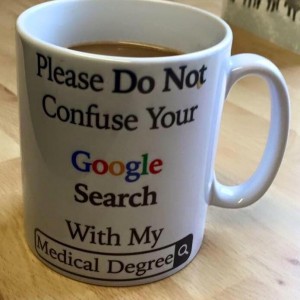
A quick note to draw your attention to two posts this week.
First, the coffee mug at right has gone crazy viral on Facebook, with over 100,000 shares in the first few days. It’s a great big mudpuddle splash, smack into the changing e-patient reality compared to how many doctors were trained. Yes, there’s junk on the internet and some people (including some patients) are loco. That does not mean patients should just shut up and expect the doctor to know everything. So, on the e-patient blog I posted this explanation:
The truth about that “your Googling and my medical degree” mug
Second, yesterday’s Washington Post had a great, well researched and comprehensive piece about medicine listening to patients. Reporter Susan Allard Levingston interviewed and cited many people I know and several I don’t, including my doctor Danny Sands, Mayo’s Victor Montori, ACOR, SmartPatients, Inspire.com, PatientsLikeMe, the BMJ’s patient partnership program that I’m a part of, and more. My post about it:
Washington Post nails it about patient-clinician partnership
The timing of this clash couldn’t have been more perfect to illustrate the topic of my Grand Rounds as Visiting Professor at the Mayo Clinic last March: We are at the cusp of a profound paradigm change in medicine.
The whole concept of what “patient” can be and do is evolving – but most people don’t know it. Many patients and many docs think patients couldn’t possibly know anything useful; that is no longer the case, and culture clash is happening.
Honestly, this is the work of evangelism – spreading the word, making the case. And you know people are starting to notice when “the empire strikes back,” as illustrated by that coffee mug piece.
Please:
If you don’t yet know about the Belgian health department’s anti-googling campaign (taxpayer-funded!), and you don’t yet know about the British teen who died because her docs told her to stop googling, go read that coffee mug piece. Then read the comments from patients who helped their docs make a correct diagnosis. Then skip over to the Washington Post piece, and read about “the real reality.”
And spread the word! Culture change only succeeds when people spread the word. Thank you!


The only ones scared by a patient googling are ones who aren’t confident in their ability to look up said information & know that either they can counter it with science or appreciate patients who look up medical research.
Hi Vic –
I myself wouldn’t say that, personally. Some people ARE bozos, and since patients are people, it follows that some patients are bozos. And I suspect a key disconnect between our world and theirs is this:
As it says on the e-patients.net post that I linked to, the mug was posted by an E.R.’s Facebook page (in the UK, as it happens).
Many of the amazing e-patient stories I’ve heard have been about a difficult diagnosis or some such, and I bet those cases are very different from what the typical ER doc sees.
Please do see the original blog post for some much meatier thoughts about it, including LOTS of really good comments.
I think that a comment I read on a Listserv (not sure which one) puts this in context and highlights two of the major issues faced by patients, providers not up to date on their condition and limited time during visits to even determine what the other knows.
“Don’t confuse your 20 year old degree and 7 minute office visit with current evidence-based practice or a thorough understanding of my condition.” (Not a direct quote, what I remember, will try to find source, or reply if you recognize the statement)
Marge Benham-Hutchins, I about died laughing seeing your comment because the doctor I had the most trouble with said EXACTLY
“I’ve been a doctor for 20 years”
(in response to one of my questions).